Cross Cultural Management Challenges: Hydro Generation Tanzania
VerifiedAdded on 2023/06/18
|9
|3029
|312
Case Study
AI Summary
This case study examines cross-cultural management challenges faced by Hydro Generation in Tanzania, focusing on organizational culture, communication, negotiation, motivation, and HRM practices. The analysis identifies issues such as differences in US and Tanzanian business cultures, unethical behavior, language barriers, varying communication styles (collectivism vs. individualism), and ineffective hiring practices. Recommendations include applying Hofstede's cultural dimensions theory, contingency theory, and the 7C's of communication, as well as implementing effective hiring strategies and motivation techniques to improve employee satisfaction and overall performance. Desklib provides access to similar case studies and study resources for students.
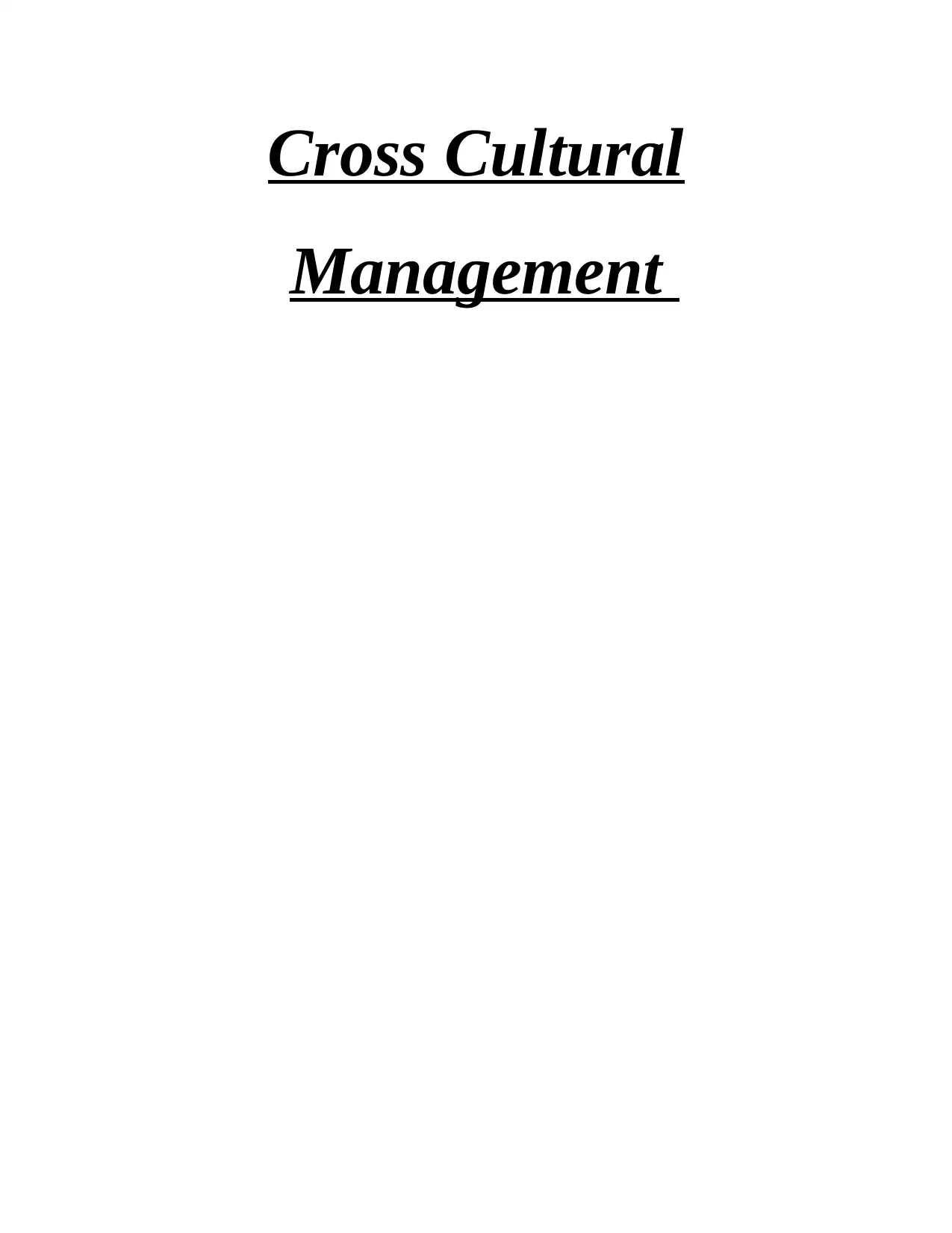
Cross Cultural
Management
Management
Paraphrase This Document
Need a fresh take? Get an instant paraphrase of this document with our AI Paraphraser
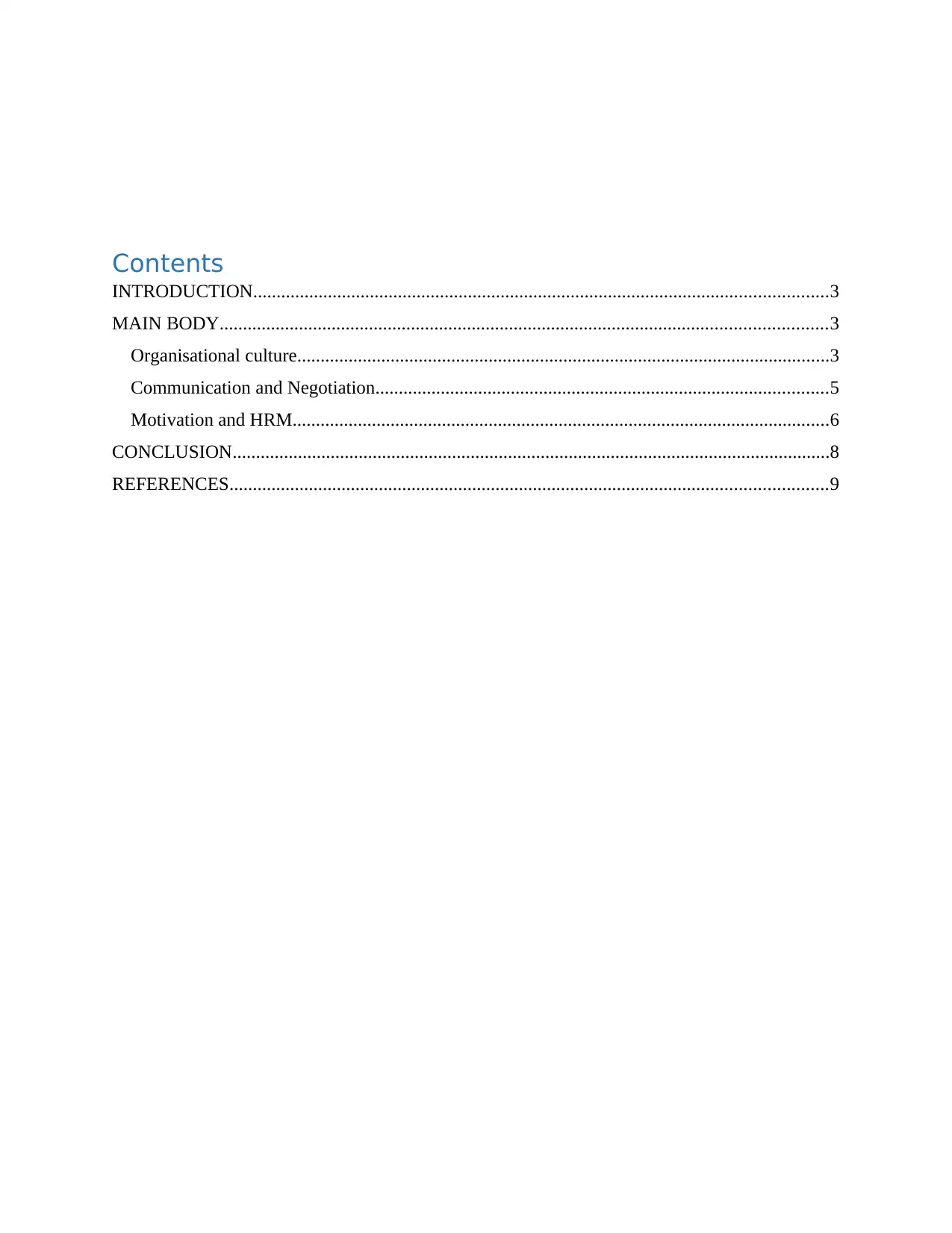
Contents
INTRODUCTION...........................................................................................................................3
MAIN BODY..................................................................................................................................3
Organisational culture..................................................................................................................3
Communication and Negotiation.................................................................................................5
Motivation and HRM...................................................................................................................6
CONCLUSION................................................................................................................................8
REFERENCES................................................................................................................................9
INTRODUCTION...........................................................................................................................3
MAIN BODY..................................................................................................................................3
Organisational culture..................................................................................................................3
Communication and Negotiation.................................................................................................5
Motivation and HRM...................................................................................................................6
CONCLUSION................................................................................................................................8
REFERENCES................................................................................................................................9
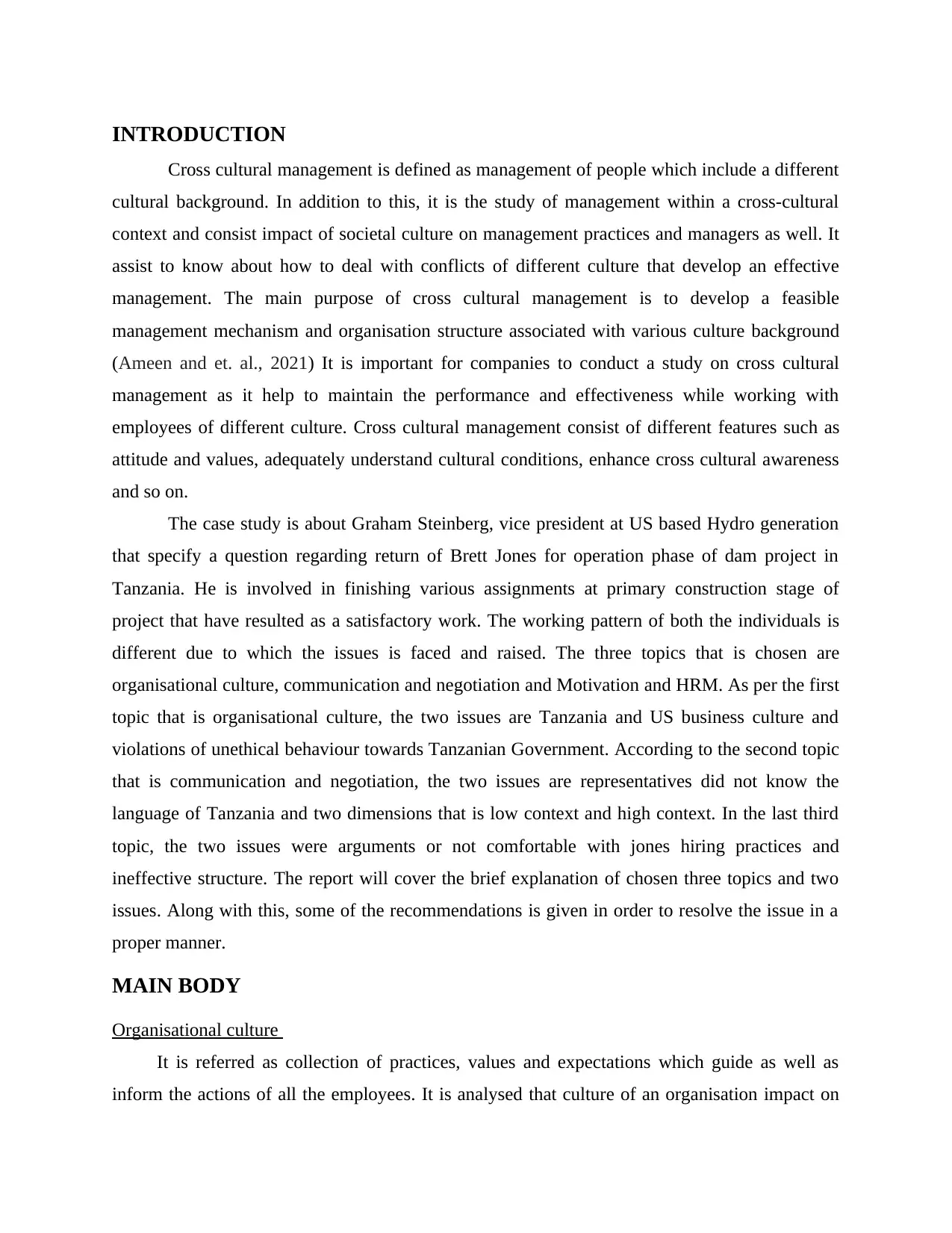
INTRODUCTION
Cross cultural management is defined as management of people which include a different
cultural background. In addition to this, it is the study of management within a cross-cultural
context and consist impact of societal culture on management practices and managers as well. It
assist to know about how to deal with conflicts of different culture that develop an effective
management. The main purpose of cross cultural management is to develop a feasible
management mechanism and organisation structure associated with various culture background
(Ameen and et. al., 2021) It is important for companies to conduct a study on cross cultural
management as it help to maintain the performance and effectiveness while working with
employees of different culture. Cross cultural management consist of different features such as
attitude and values, adequately understand cultural conditions, enhance cross cultural awareness
and so on.
The case study is about Graham Steinberg, vice president at US based Hydro generation
that specify a question regarding return of Brett Jones for operation phase of dam project in
Tanzania. He is involved in finishing various assignments at primary construction stage of
project that have resulted as a satisfactory work. The working pattern of both the individuals is
different due to which the issues is faced and raised. The three topics that is chosen are
organisational culture, communication and negotiation and Motivation and HRM. As per the first
topic that is organisational culture, the two issues are Tanzania and US business culture and
violations of unethical behaviour towards Tanzanian Government. According to the second topic
that is communication and negotiation, the two issues are representatives did not know the
language of Tanzania and two dimensions that is low context and high context. In the last third
topic, the two issues were arguments or not comfortable with jones hiring practices and
ineffective structure. The report will cover the brief explanation of chosen three topics and two
issues. Along with this, some of the recommendations is given in order to resolve the issue in a
proper manner.
MAIN BODY
Organisational culture
It is referred as collection of practices, values and expectations which guide as well as
inform the actions of all the employees. It is analysed that culture of an organisation impact on
Cross cultural management is defined as management of people which include a different
cultural background. In addition to this, it is the study of management within a cross-cultural
context and consist impact of societal culture on management practices and managers as well. It
assist to know about how to deal with conflicts of different culture that develop an effective
management. The main purpose of cross cultural management is to develop a feasible
management mechanism and organisation structure associated with various culture background
(Ameen and et. al., 2021) It is important for companies to conduct a study on cross cultural
management as it help to maintain the performance and effectiveness while working with
employees of different culture. Cross cultural management consist of different features such as
attitude and values, adequately understand cultural conditions, enhance cross cultural awareness
and so on.
The case study is about Graham Steinberg, vice president at US based Hydro generation
that specify a question regarding return of Brett Jones for operation phase of dam project in
Tanzania. He is involved in finishing various assignments at primary construction stage of
project that have resulted as a satisfactory work. The working pattern of both the individuals is
different due to which the issues is faced and raised. The three topics that is chosen are
organisational culture, communication and negotiation and Motivation and HRM. As per the first
topic that is organisational culture, the two issues are Tanzania and US business culture and
violations of unethical behaviour towards Tanzanian Government. According to the second topic
that is communication and negotiation, the two issues are representatives did not know the
language of Tanzania and two dimensions that is low context and high context. In the last third
topic, the two issues were arguments or not comfortable with jones hiring practices and
ineffective structure. The report will cover the brief explanation of chosen three topics and two
issues. Along with this, some of the recommendations is given in order to resolve the issue in a
proper manner.
MAIN BODY
Organisational culture
It is referred as collection of practices, values and expectations which guide as well as
inform the actions of all the employees. It is analysed that culture of an organisation impact on
⊘ This is a preview!⊘
Do you want full access?
Subscribe today to unlock all pages.

Trusted by 1+ million students worldwide
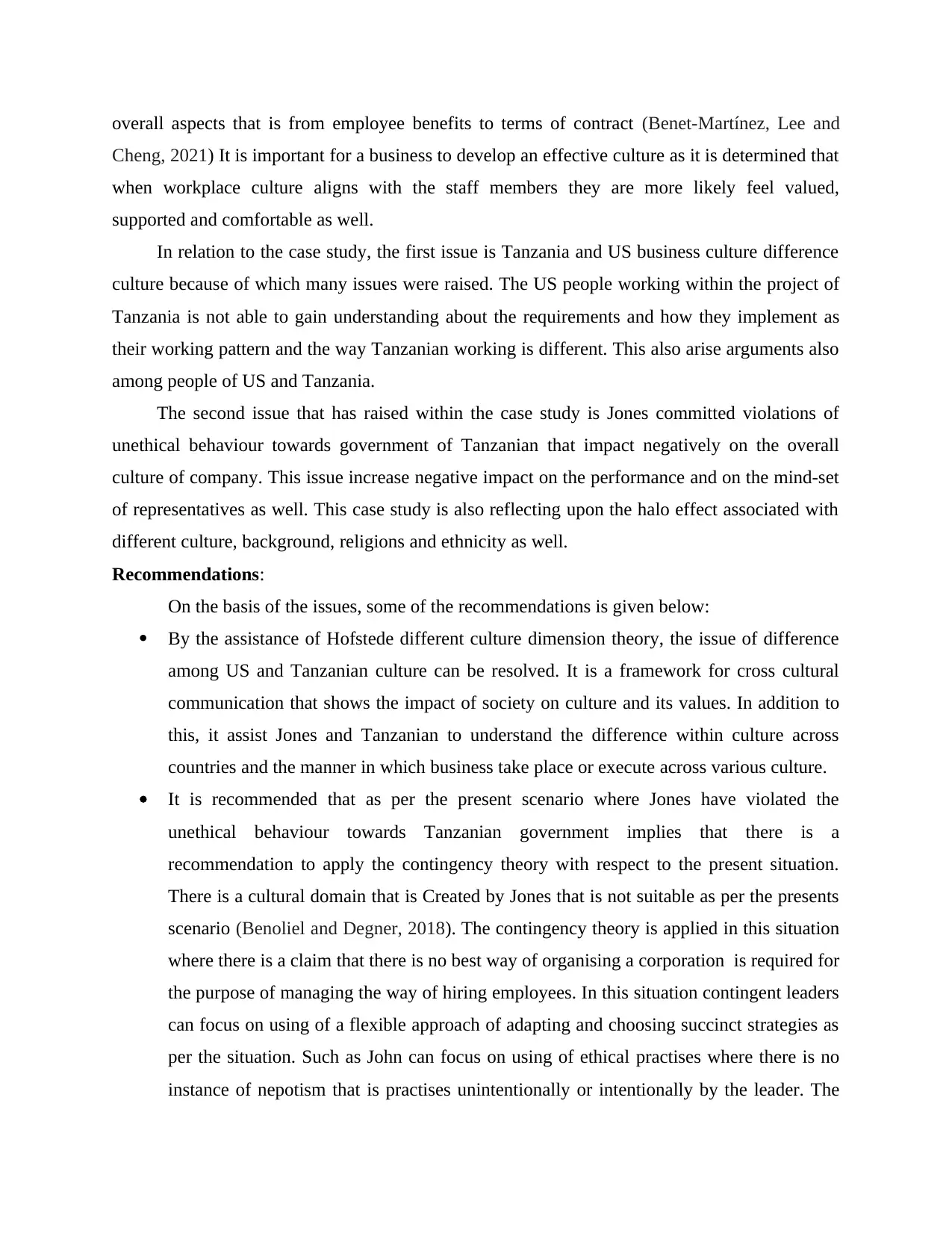
overall aspects that is from employee benefits to terms of contract (Benet-Martínez, Lee and
Cheng, 2021) It is important for a business to develop an effective culture as it is determined that
when workplace culture aligns with the staff members they are more likely feel valued,
supported and comfortable as well.
In relation to the case study, the first issue is Tanzania and US business culture difference
culture because of which many issues were raised. The US people working within the project of
Tanzania is not able to gain understanding about the requirements and how they implement as
their working pattern and the way Tanzanian working is different. This also arise arguments also
among people of US and Tanzania.
The second issue that has raised within the case study is Jones committed violations of
unethical behaviour towards government of Tanzanian that impact negatively on the overall
culture of company. This issue increase negative impact on the performance and on the mind-set
of representatives as well. This case study is also reflecting upon the halo effect associated with
different culture, background, religions and ethnicity as well.
Recommendations:
On the basis of the issues, some of the recommendations is given below:
By the assistance of Hofstede different culture dimension theory, the issue of difference
among US and Tanzanian culture can be resolved. It is a framework for cross cultural
communication that shows the impact of society on culture and its values. In addition to
this, it assist Jones and Tanzanian to understand the difference within culture across
countries and the manner in which business take place or execute across various culture.
It is recommended that as per the present scenario where Jones have violated the
unethical behaviour towards Tanzanian government implies that there is a
recommendation to apply the contingency theory with respect to the present situation.
There is a cultural domain that is Created by Jones that is not suitable as per the presents
scenario (Benoliel and Degner, 2018). The contingency theory is applied in this situation
where there is a claim that there is no best way of organising a corporation is required for
the purpose of managing the way of hiring employees. In this situation contingent leaders
can focus on using of a flexible approach of adapting and choosing succinct strategies as
per the situation. Such as John can focus on using of ethical practises where there is no
instance of nepotism that is practises unintentionally or intentionally by the leader. The
Cheng, 2021) It is important for a business to develop an effective culture as it is determined that
when workplace culture aligns with the staff members they are more likely feel valued,
supported and comfortable as well.
In relation to the case study, the first issue is Tanzania and US business culture difference
culture because of which many issues were raised. The US people working within the project of
Tanzania is not able to gain understanding about the requirements and how they implement as
their working pattern and the way Tanzanian working is different. This also arise arguments also
among people of US and Tanzania.
The second issue that has raised within the case study is Jones committed violations of
unethical behaviour towards government of Tanzanian that impact negatively on the overall
culture of company. This issue increase negative impact on the performance and on the mind-set
of representatives as well. This case study is also reflecting upon the halo effect associated with
different culture, background, religions and ethnicity as well.
Recommendations:
On the basis of the issues, some of the recommendations is given below:
By the assistance of Hofstede different culture dimension theory, the issue of difference
among US and Tanzanian culture can be resolved. It is a framework for cross cultural
communication that shows the impact of society on culture and its values. In addition to
this, it assist Jones and Tanzanian to understand the difference within culture across
countries and the manner in which business take place or execute across various culture.
It is recommended that as per the present scenario where Jones have violated the
unethical behaviour towards Tanzanian government implies that there is a
recommendation to apply the contingency theory with respect to the present situation.
There is a cultural domain that is Created by Jones that is not suitable as per the presents
scenario (Benoliel and Degner, 2018). The contingency theory is applied in this situation
where there is a claim that there is no best way of organising a corporation is required for
the purpose of managing the way of hiring employees. In this situation contingent leaders
can focus on using of a flexible approach of adapting and choosing succinct strategies as
per the situation. Such as John can focus on using of ethical practises where there is no
instance of nepotism that is practises unintentionally or intentionally by the leader. The
Paraphrase This Document
Need a fresh take? Get an instant paraphrase of this document with our AI Paraphraser
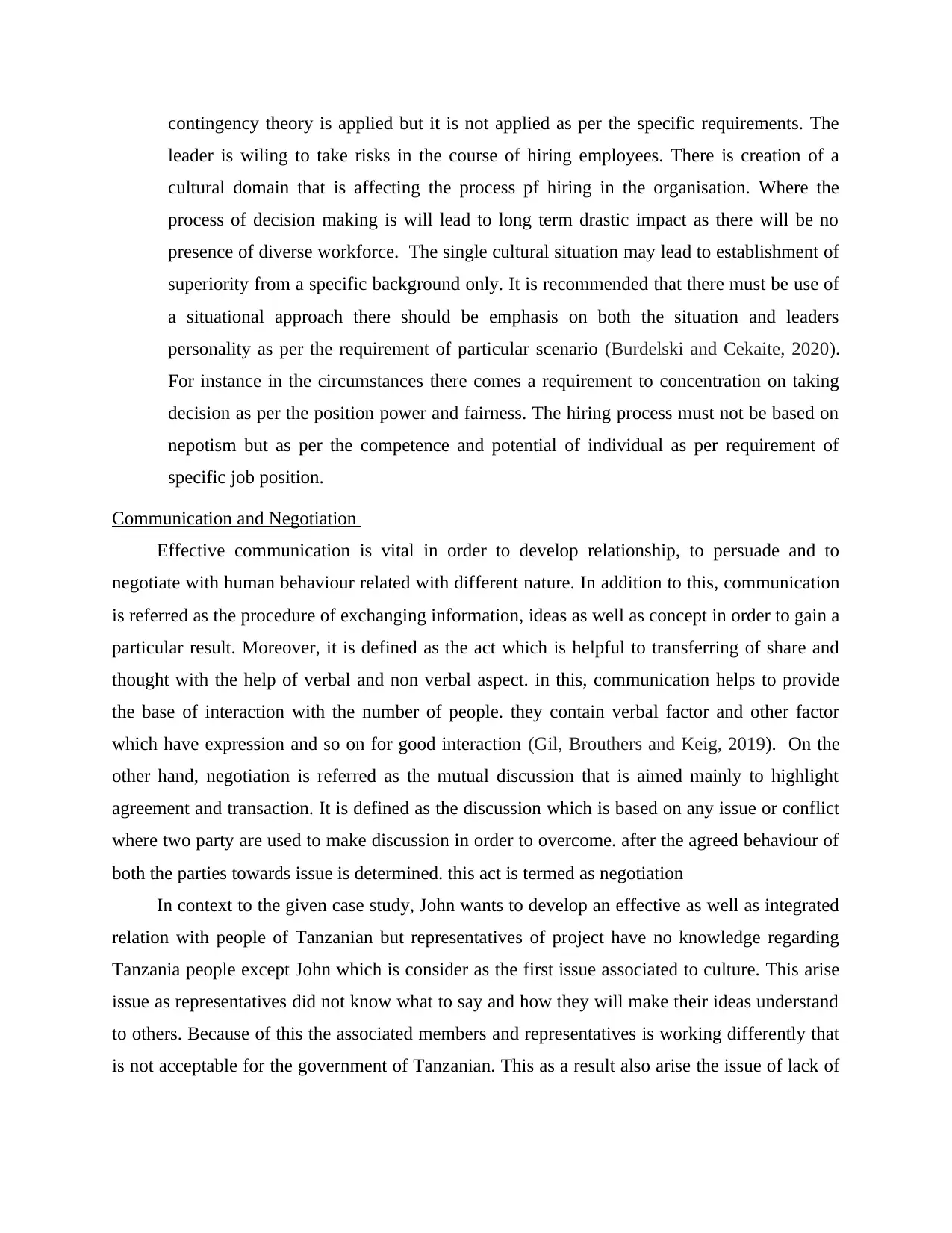
contingency theory is applied but it is not applied as per the specific requirements. The
leader is wiling to take risks in the course of hiring employees. There is creation of a
cultural domain that is affecting the process pf hiring in the organisation. Where the
process of decision making is will lead to long term drastic impact as there will be no
presence of diverse workforce. The single cultural situation may lead to establishment of
superiority from a specific background only. It is recommended that there must be use of
a situational approach there should be emphasis on both the situation and leaders
personality as per the requirement of particular scenario (Burdelski and Cekaite, 2020).
For instance in the circumstances there comes a requirement to concentration on taking
decision as per the position power and fairness. The hiring process must not be based on
nepotism but as per the competence and potential of individual as per requirement of
specific job position.
Communication and Negotiation
Effective communication is vital in order to develop relationship, to persuade and to
negotiate with human behaviour related with different nature. In addition to this, communication
is referred as the procedure of exchanging information, ideas as well as concept in order to gain a
particular result. Moreover, it is defined as the act which is helpful to transferring of share and
thought with the help of verbal and non verbal aspect. in this, communication helps to provide
the base of interaction with the number of people. they contain verbal factor and other factor
which have expression and so on for good interaction (Gil, Brouthers and Keig, 2019). On the
other hand, negotiation is referred as the mutual discussion that is aimed mainly to highlight
agreement and transaction. It is defined as the discussion which is based on any issue or conflict
where two party are used to make discussion in order to overcome. after the agreed behaviour of
both the parties towards issue is determined. this act is termed as negotiation
In context to the given case study, John wants to develop an effective as well as integrated
relation with people of Tanzanian but representatives of project have no knowledge regarding
Tanzania people except John which is consider as the first issue associated to culture. This arise
issue as representatives did not know what to say and how they will make their ideas understand
to others. Because of this the associated members and representatives is working differently that
is not acceptable for the government of Tanzanian. This as a result also arise the issue of lack of
leader is wiling to take risks in the course of hiring employees. There is creation of a
cultural domain that is affecting the process pf hiring in the organisation. Where the
process of decision making is will lead to long term drastic impact as there will be no
presence of diverse workforce. The single cultural situation may lead to establishment of
superiority from a specific background only. It is recommended that there must be use of
a situational approach there should be emphasis on both the situation and leaders
personality as per the requirement of particular scenario (Burdelski and Cekaite, 2020).
For instance in the circumstances there comes a requirement to concentration on taking
decision as per the position power and fairness. The hiring process must not be based on
nepotism but as per the competence and potential of individual as per requirement of
specific job position.
Communication and Negotiation
Effective communication is vital in order to develop relationship, to persuade and to
negotiate with human behaviour related with different nature. In addition to this, communication
is referred as the procedure of exchanging information, ideas as well as concept in order to gain a
particular result. Moreover, it is defined as the act which is helpful to transferring of share and
thought with the help of verbal and non verbal aspect. in this, communication helps to provide
the base of interaction with the number of people. they contain verbal factor and other factor
which have expression and so on for good interaction (Gil, Brouthers and Keig, 2019). On the
other hand, negotiation is referred as the mutual discussion that is aimed mainly to highlight
agreement and transaction. It is defined as the discussion which is based on any issue or conflict
where two party are used to make discussion in order to overcome. after the agreed behaviour of
both the parties towards issue is determined. this act is termed as negotiation
In context to the given case study, John wants to develop an effective as well as integrated
relation with people of Tanzanian but representatives of project have no knowledge regarding
Tanzania people except John which is consider as the first issue associated to culture. This arise
issue as representatives did not know what to say and how they will make their ideas understand
to others. Because of this the associated members and representatives is working differently that
is not acceptable for the government of Tanzanian. This as a result also arise the issue of lack of
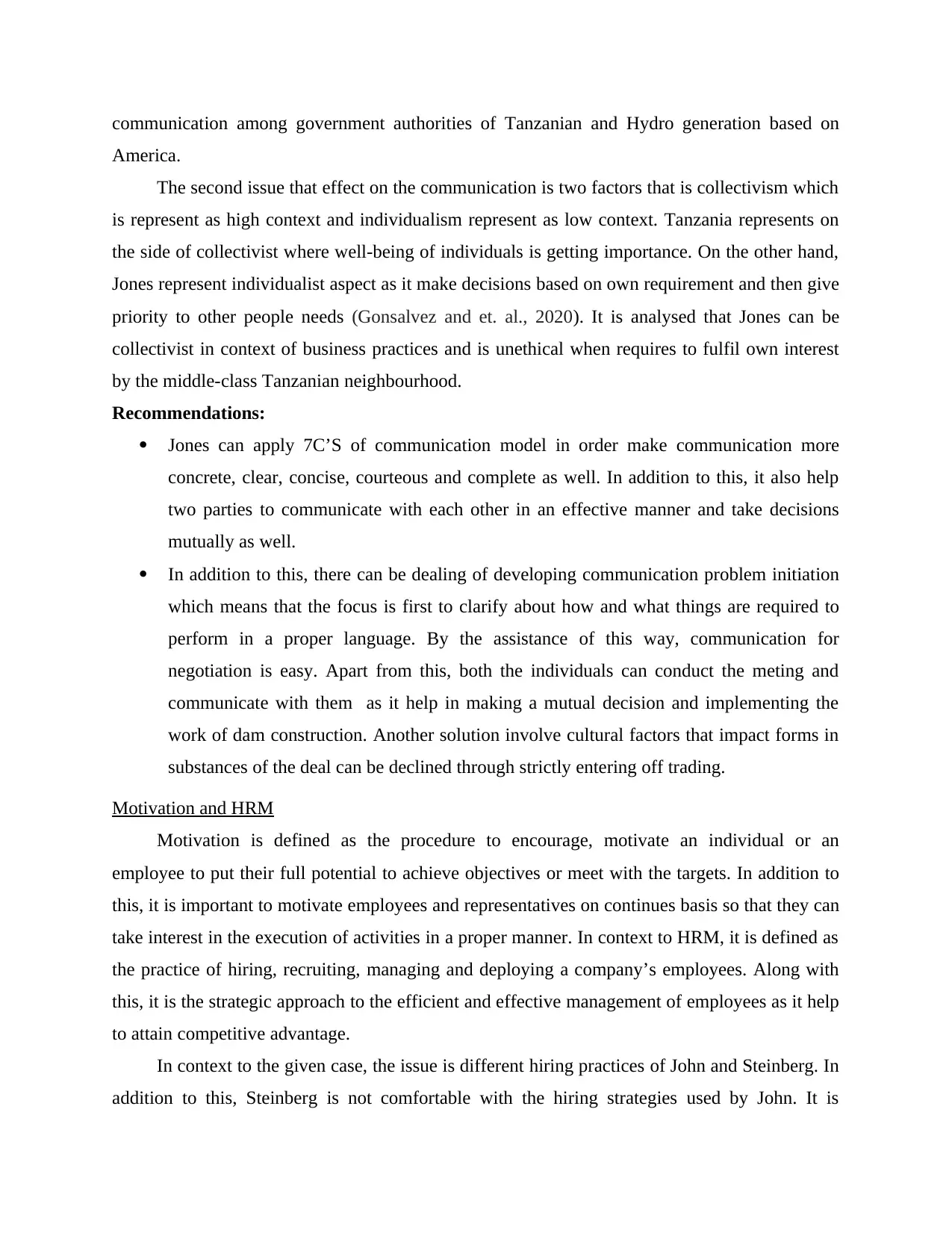
communication among government authorities of Tanzanian and Hydro generation based on
America.
The second issue that effect on the communication is two factors that is collectivism which
is represent as high context and individualism represent as low context. Tanzania represents on
the side of collectivist where well-being of individuals is getting importance. On the other hand,
Jones represent individualist aspect as it make decisions based on own requirement and then give
priority to other people needs (Gonsalvez and et. al., 2020). It is analysed that Jones can be
collectivist in context of business practices and is unethical when requires to fulfil own interest
by the middle-class Tanzanian neighbourhood.
Recommendations:
Jones can apply 7C’S of communication model in order make communication more
concrete, clear, concise, courteous and complete as well. In addition to this, it also help
two parties to communicate with each other in an effective manner and take decisions
mutually as well.
In addition to this, there can be dealing of developing communication problem initiation
which means that the focus is first to clarify about how and what things are required to
perform in a proper language. By the assistance of this way, communication for
negotiation is easy. Apart from this, both the individuals can conduct the meting and
communicate with them as it help in making a mutual decision and implementing the
work of dam construction. Another solution involve cultural factors that impact forms in
substances of the deal can be declined through strictly entering off trading.
Motivation and HRM
Motivation is defined as the procedure to encourage, motivate an individual or an
employee to put their full potential to achieve objectives or meet with the targets. In addition to
this, it is important to motivate employees and representatives on continues basis so that they can
take interest in the execution of activities in a proper manner. In context to HRM, it is defined as
the practice of hiring, recruiting, managing and deploying a company’s employees. Along with
this, it is the strategic approach to the efficient and effective management of employees as it help
to attain competitive advantage.
In context to the given case, the issue is different hiring practices of John and Steinberg. In
addition to this, Steinberg is not comfortable with the hiring strategies used by John. It is
America.
The second issue that effect on the communication is two factors that is collectivism which
is represent as high context and individualism represent as low context. Tanzania represents on
the side of collectivist where well-being of individuals is getting importance. On the other hand,
Jones represent individualist aspect as it make decisions based on own requirement and then give
priority to other people needs (Gonsalvez and et. al., 2020). It is analysed that Jones can be
collectivist in context of business practices and is unethical when requires to fulfil own interest
by the middle-class Tanzanian neighbourhood.
Recommendations:
Jones can apply 7C’S of communication model in order make communication more
concrete, clear, concise, courteous and complete as well. In addition to this, it also help
two parties to communicate with each other in an effective manner and take decisions
mutually as well.
In addition to this, there can be dealing of developing communication problem initiation
which means that the focus is first to clarify about how and what things are required to
perform in a proper language. By the assistance of this way, communication for
negotiation is easy. Apart from this, both the individuals can conduct the meting and
communicate with them as it help in making a mutual decision and implementing the
work of dam construction. Another solution involve cultural factors that impact forms in
substances of the deal can be declined through strictly entering off trading.
Motivation and HRM
Motivation is defined as the procedure to encourage, motivate an individual or an
employee to put their full potential to achieve objectives or meet with the targets. In addition to
this, it is important to motivate employees and representatives on continues basis so that they can
take interest in the execution of activities in a proper manner. In context to HRM, it is defined as
the practice of hiring, recruiting, managing and deploying a company’s employees. Along with
this, it is the strategic approach to the efficient and effective management of employees as it help
to attain competitive advantage.
In context to the given case, the issue is different hiring practices of John and Steinberg. In
addition to this, Steinberg is not comfortable with the hiring strategies used by John. It is
⊘ This is a preview!⊘
Do you want full access?
Subscribe today to unlock all pages.

Trusted by 1+ million students worldwide
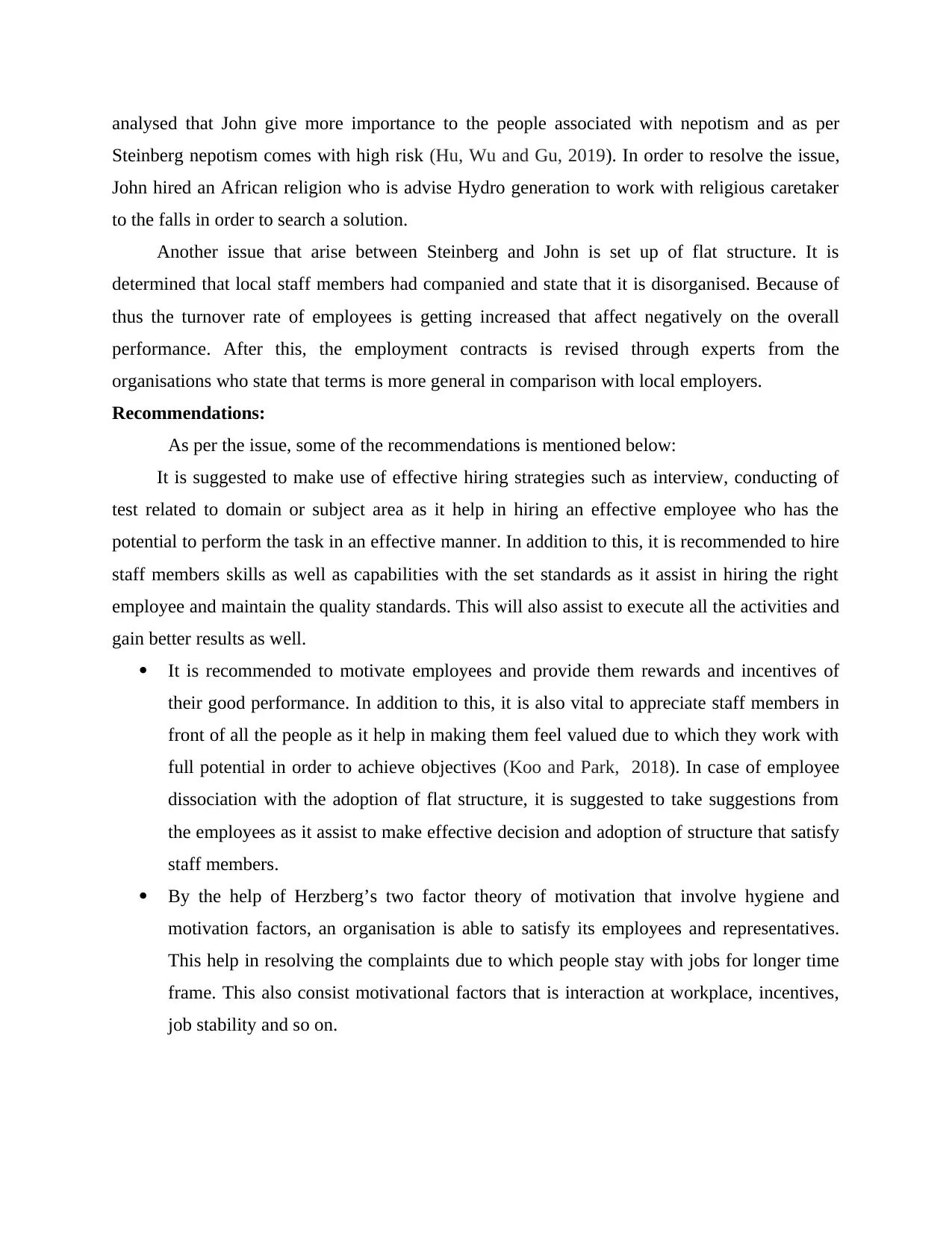
analysed that John give more importance to the people associated with nepotism and as per
Steinberg nepotism comes with high risk (Hu, Wu and Gu, 2019). In order to resolve the issue,
John hired an African religion who is advise Hydro generation to work with religious caretaker
to the falls in order to search a solution.
Another issue that arise between Steinberg and John is set up of flat structure. It is
determined that local staff members had companied and state that it is disorganised. Because of
thus the turnover rate of employees is getting increased that affect negatively on the overall
performance. After this, the employment contracts is revised through experts from the
organisations who state that terms is more general in comparison with local employers.
Recommendations:
As per the issue, some of the recommendations is mentioned below:
It is suggested to make use of effective hiring strategies such as interview, conducting of
test related to domain or subject area as it help in hiring an effective employee who has the
potential to perform the task in an effective manner. In addition to this, it is recommended to hire
staff members skills as well as capabilities with the set standards as it assist in hiring the right
employee and maintain the quality standards. This will also assist to execute all the activities and
gain better results as well.
It is recommended to motivate employees and provide them rewards and incentives of
their good performance. In addition to this, it is also vital to appreciate staff members in
front of all the people as it help in making them feel valued due to which they work with
full potential in order to achieve objectives (Koo and Park, 2018). In case of employee
dissociation with the adoption of flat structure, it is suggested to take suggestions from
the employees as it assist to make effective decision and adoption of structure that satisfy
staff members.
By the help of Herzberg’s two factor theory of motivation that involve hygiene and
motivation factors, an organisation is able to satisfy its employees and representatives.
This help in resolving the complaints due to which people stay with jobs for longer time
frame. This also consist motivational factors that is interaction at workplace, incentives,
job stability and so on.
Steinberg nepotism comes with high risk (Hu, Wu and Gu, 2019). In order to resolve the issue,
John hired an African religion who is advise Hydro generation to work with religious caretaker
to the falls in order to search a solution.
Another issue that arise between Steinberg and John is set up of flat structure. It is
determined that local staff members had companied and state that it is disorganised. Because of
thus the turnover rate of employees is getting increased that affect negatively on the overall
performance. After this, the employment contracts is revised through experts from the
organisations who state that terms is more general in comparison with local employers.
Recommendations:
As per the issue, some of the recommendations is mentioned below:
It is suggested to make use of effective hiring strategies such as interview, conducting of
test related to domain or subject area as it help in hiring an effective employee who has the
potential to perform the task in an effective manner. In addition to this, it is recommended to hire
staff members skills as well as capabilities with the set standards as it assist in hiring the right
employee and maintain the quality standards. This will also assist to execute all the activities and
gain better results as well.
It is recommended to motivate employees and provide them rewards and incentives of
their good performance. In addition to this, it is also vital to appreciate staff members in
front of all the people as it help in making them feel valued due to which they work with
full potential in order to achieve objectives (Koo and Park, 2018). In case of employee
dissociation with the adoption of flat structure, it is suggested to take suggestions from
the employees as it assist to make effective decision and adoption of structure that satisfy
staff members.
By the help of Herzberg’s two factor theory of motivation that involve hygiene and
motivation factors, an organisation is able to satisfy its employees and representatives.
This help in resolving the complaints due to which people stay with jobs for longer time
frame. This also consist motivational factors that is interaction at workplace, incentives,
job stability and so on.
Paraphrase This Document
Need a fresh take? Get an instant paraphrase of this document with our AI Paraphraser
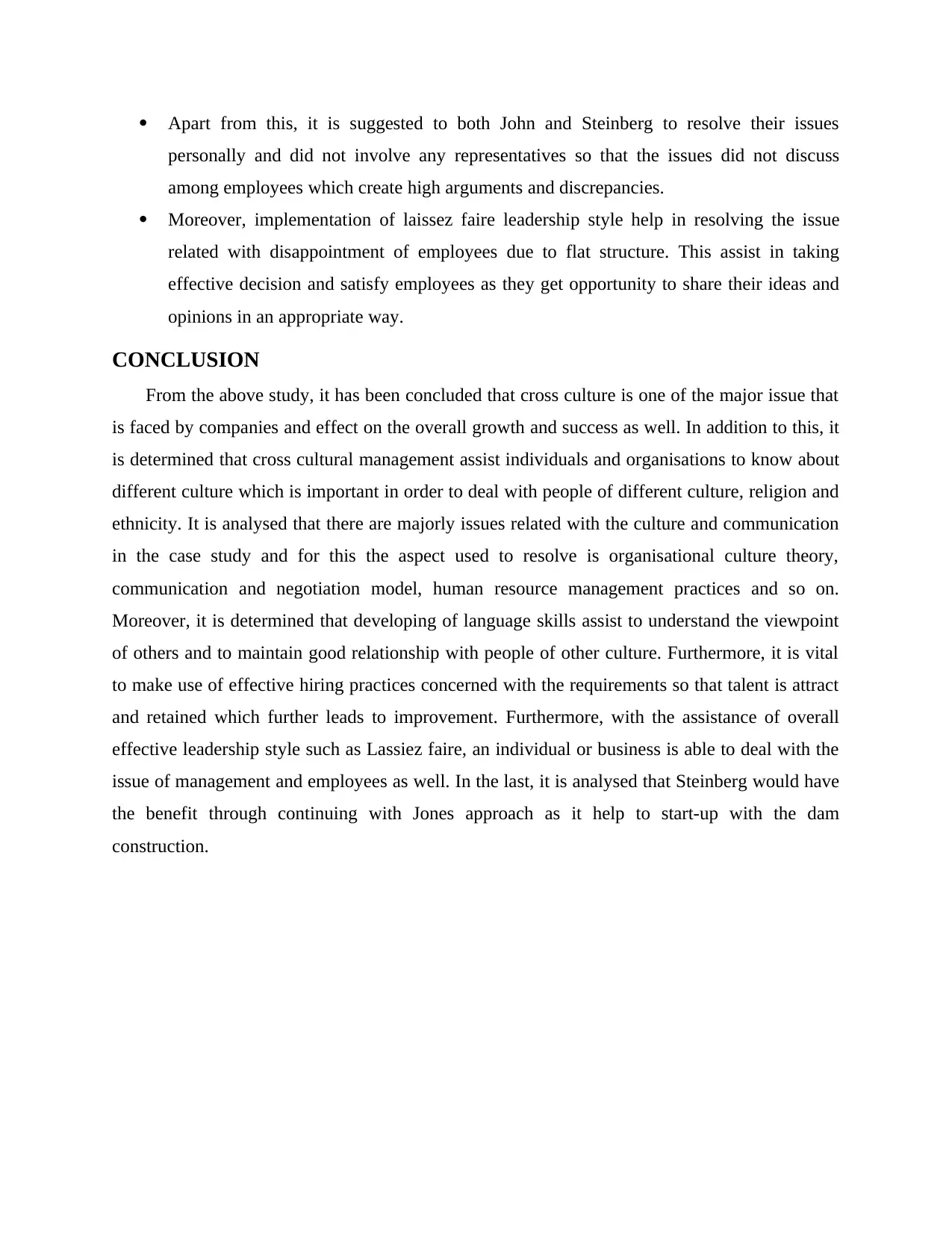
Apart from this, it is suggested to both John and Steinberg to resolve their issues
personally and did not involve any representatives so that the issues did not discuss
among employees which create high arguments and discrepancies.
Moreover, implementation of laissez faire leadership style help in resolving the issue
related with disappointment of employees due to flat structure. This assist in taking
effective decision and satisfy employees as they get opportunity to share their ideas and
opinions in an appropriate way.
CONCLUSION
From the above study, it has been concluded that cross culture is one of the major issue that
is faced by companies and effect on the overall growth and success as well. In addition to this, it
is determined that cross cultural management assist individuals and organisations to know about
different culture which is important in order to deal with people of different culture, religion and
ethnicity. It is analysed that there are majorly issues related with the culture and communication
in the case study and for this the aspect used to resolve is organisational culture theory,
communication and negotiation model, human resource management practices and so on.
Moreover, it is determined that developing of language skills assist to understand the viewpoint
of others and to maintain good relationship with people of other culture. Furthermore, it is vital
to make use of effective hiring practices concerned with the requirements so that talent is attract
and retained which further leads to improvement. Furthermore, with the assistance of overall
effective leadership style such as Lassiez faire, an individual or business is able to deal with the
issue of management and employees as well. In the last, it is analysed that Steinberg would have
the benefit through continuing with Jones approach as it help to start-up with the dam
construction.
personally and did not involve any representatives so that the issues did not discuss
among employees which create high arguments and discrepancies.
Moreover, implementation of laissez faire leadership style help in resolving the issue
related with disappointment of employees due to flat structure. This assist in taking
effective decision and satisfy employees as they get opportunity to share their ideas and
opinions in an appropriate way.
CONCLUSION
From the above study, it has been concluded that cross culture is one of the major issue that
is faced by companies and effect on the overall growth and success as well. In addition to this, it
is determined that cross cultural management assist individuals and organisations to know about
different culture which is important in order to deal with people of different culture, religion and
ethnicity. It is analysed that there are majorly issues related with the culture and communication
in the case study and for this the aspect used to resolve is organisational culture theory,
communication and negotiation model, human resource management practices and so on.
Moreover, it is determined that developing of language skills assist to understand the viewpoint
of others and to maintain good relationship with people of other culture. Furthermore, it is vital
to make use of effective hiring practices concerned with the requirements so that talent is attract
and retained which further leads to improvement. Furthermore, with the assistance of overall
effective leadership style such as Lassiez faire, an individual or business is able to deal with the
issue of management and employees as well. In the last, it is analysed that Steinberg would have
the benefit through continuing with Jones approach as it help to start-up with the dam
construction.
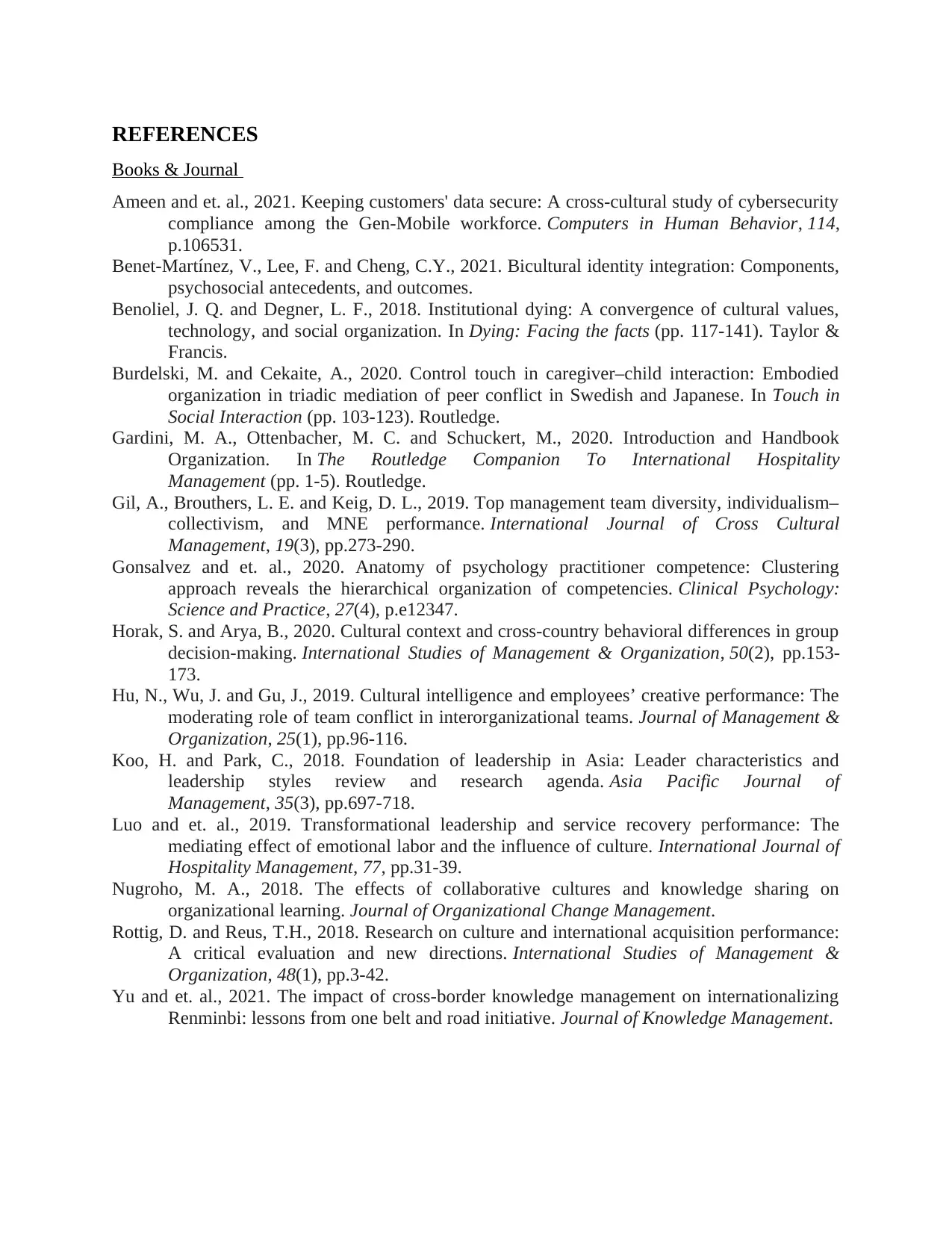
REFERENCES
Books & Journal
Ameen and et. al., 2021. Keeping customers' data secure: A cross-cultural study of cybersecurity
compliance among the Gen-Mobile workforce. Computers in Human Behavior, 114,
p.106531.
Benet-Martínez, V., Lee, F. and Cheng, C.Y., 2021. Bicultural identity integration: Components,
psychosocial antecedents, and outcomes.
Benoliel, J. Q. and Degner, L. F., 2018. Institutional dying: A convergence of cultural values,
technology, and social organization. In Dying: Facing the facts (pp. 117-141). Taylor &
Francis.
Burdelski, M. and Cekaite, A., 2020. Control touch in caregiver–child interaction: Embodied
organization in triadic mediation of peer conflict in Swedish and Japanese. In Touch in
Social Interaction (pp. 103-123). Routledge.
Gardini, M. A., Ottenbacher, M. C. and Schuckert, M., 2020. Introduction and Handbook
Organization. In The Routledge Companion To International Hospitality
Management (pp. 1-5). Routledge.
Gil, A., Brouthers, L. E. and Keig, D. L., 2019. Top management team diversity, individualism–
collectivism, and MNE performance. International Journal of Cross Cultural
Management, 19(3), pp.273-290.
Gonsalvez and et. al., 2020. Anatomy of psychology practitioner competence: Clustering
approach reveals the hierarchical organization of competencies. Clinical Psychology:
Science and Practice, 27(4), p.e12347.
Horak, S. and Arya, B., 2020. Cultural context and cross-country behavioral differences in group
decision-making. International Studies of Management & Organization, 50(2), pp.153-
173.
Hu, N., Wu, J. and Gu, J., 2019. Cultural intelligence and employees’ creative performance: The
moderating role of team conflict in interorganizational teams. Journal of Management &
Organization, 25(1), pp.96-116.
Koo, H. and Park, C., 2018. Foundation of leadership in Asia: Leader characteristics and
leadership styles review and research agenda. Asia Pacific Journal of
Management, 35(3), pp.697-718.
Luo and et. al., 2019. Transformational leadership and service recovery performance: The
mediating effect of emotional labor and the influence of culture. International Journal of
Hospitality Management, 77, pp.31-39.
Nugroho, M. A., 2018. The effects of collaborative cultures and knowledge sharing on
organizational learning. Journal of Organizational Change Management.
Rottig, D. and Reus, T.H., 2018. Research on culture and international acquisition performance:
A critical evaluation and new directions. International Studies of Management &
Organization, 48(1), pp.3-42.
Yu and et. al., 2021. The impact of cross-border knowledge management on internationalizing
Renminbi: lessons from one belt and road initiative. Journal of Knowledge Management.
Books & Journal
Ameen and et. al., 2021. Keeping customers' data secure: A cross-cultural study of cybersecurity
compliance among the Gen-Mobile workforce. Computers in Human Behavior, 114,
p.106531.
Benet-Martínez, V., Lee, F. and Cheng, C.Y., 2021. Bicultural identity integration: Components,
psychosocial antecedents, and outcomes.
Benoliel, J. Q. and Degner, L. F., 2018. Institutional dying: A convergence of cultural values,
technology, and social organization. In Dying: Facing the facts (pp. 117-141). Taylor &
Francis.
Burdelski, M. and Cekaite, A., 2020. Control touch in caregiver–child interaction: Embodied
organization in triadic mediation of peer conflict in Swedish and Japanese. In Touch in
Social Interaction (pp. 103-123). Routledge.
Gardini, M. A., Ottenbacher, M. C. and Schuckert, M., 2020. Introduction and Handbook
Organization. In The Routledge Companion To International Hospitality
Management (pp. 1-5). Routledge.
Gil, A., Brouthers, L. E. and Keig, D. L., 2019. Top management team diversity, individualism–
collectivism, and MNE performance. International Journal of Cross Cultural
Management, 19(3), pp.273-290.
Gonsalvez and et. al., 2020. Anatomy of psychology practitioner competence: Clustering
approach reveals the hierarchical organization of competencies. Clinical Psychology:
Science and Practice, 27(4), p.e12347.
Horak, S. and Arya, B., 2020. Cultural context and cross-country behavioral differences in group
decision-making. International Studies of Management & Organization, 50(2), pp.153-
173.
Hu, N., Wu, J. and Gu, J., 2019. Cultural intelligence and employees’ creative performance: The
moderating role of team conflict in interorganizational teams. Journal of Management &
Organization, 25(1), pp.96-116.
Koo, H. and Park, C., 2018. Foundation of leadership in Asia: Leader characteristics and
leadership styles review and research agenda. Asia Pacific Journal of
Management, 35(3), pp.697-718.
Luo and et. al., 2019. Transformational leadership and service recovery performance: The
mediating effect of emotional labor and the influence of culture. International Journal of
Hospitality Management, 77, pp.31-39.
Nugroho, M. A., 2018. The effects of collaborative cultures and knowledge sharing on
organizational learning. Journal of Organizational Change Management.
Rottig, D. and Reus, T.H., 2018. Research on culture and international acquisition performance:
A critical evaluation and new directions. International Studies of Management &
Organization, 48(1), pp.3-42.
Yu and et. al., 2021. The impact of cross-border knowledge management on internationalizing
Renminbi: lessons from one belt and road initiative. Journal of Knowledge Management.
⊘ This is a preview!⊘
Do you want full access?
Subscribe today to unlock all pages.

Trusted by 1+ million students worldwide
1 out of 9
Related Documents
Your All-in-One AI-Powered Toolkit for Academic Success.
+13062052269
info@desklib.com
Available 24*7 on WhatsApp / Email
![[object Object]](/_next/static/media/star-bottom.7253800d.svg)
Unlock your academic potential
Copyright © 2020–2026 A2Z Services. All Rights Reserved. Developed and managed by ZUCOL.





